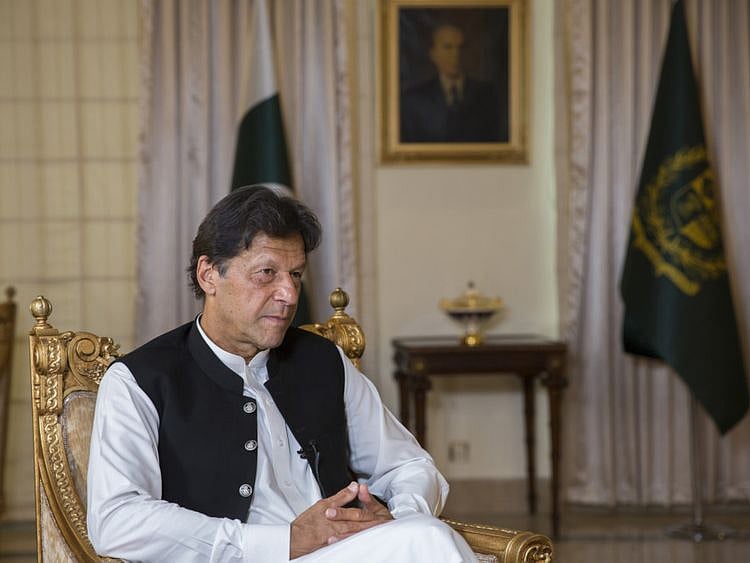The approval of a $6 billion International Monetary Fund (IMF) loan, following months of discussions between the Washington-based lender and prime minister Imran Khan’s government, marks a new beginning for Pakistan.
Imran’s government has seized the moment of IMF’s loan approval to claim victory in consolidating the future of Pakistan’s economy as the country tackles a host of challenges. The journey to seek yet another IMF loan was triggered by a mounting balance of payments crisis caused by a crash in Pakistan’s exports while imports soared, and a continuing failure to reform one of the world’s worst performing tax collection networks.
Behind these failures, however, lies a bigger failure caused by a collapse of key institutions. Pakistan’s once well performing civil service including the segments dealing with the economy has clearly weakened over time. The collapse of this key part of the government has knocked down the ability of the state to not only manage the country on a daily basis but more vitally to anticipate future challenges with a view to tackling them well ahead of time. Taken together, Pakistan faces a crisis, though manageable in yesteryears, has nevertheless grown beyond the capacity of the country’s present day ruling structure.
Broadly speaking, a key focus of the government via the IMF programme for now appears to be that of vastly turning around the dilapidated tax collection structure. The budget for the financial year which began this month seeks to add a staggering 37 per cent to the federal government’s revenue collection over the last financial year.
In a scenario with the economy growing by leaps and bounds this may have been achievable. But in the present day context where Pakistan’s economy is projected to grow by a mere 2.5 per cent or so this year, the disconnect between the reality and a hugely ambitious target is hard to comprehend.
The architects of this years’ budget may well have set an overly ambitious target driven by the belief that there’s room across Pakistan’s large black economy to finally be brought in the formal sector. Yet, independent accounts of the gap between what is legit and what is not has failed to connect the dots convincingly.
In other words, is the IMF programme doomed to fall apart midway as the case with most of its previous loans to Pakistan, due to Islamabad’s failure in meeting its obligations? That pertinent question, though a premature one, has indeed begun making the rounds.
As the government focuses on a revenue lift driven approach, there is a visible gap in appreciating the importance of sustaining investments and jobs especially in a low economic growth environment. Much has been said officially by way of lip service towards revival of economic confidence. Yet, on the ground across Pakistan, reports from business and farming communities speak of widespread uncertainty as ordinary Pakistanis cope with belt-tightening to cope with not just a mounting tax burden.
More importantly, the government’s repeatedly zealous promises to stamp out corruption appear to have given unbridled powers to functionaries in key institutions, notably those dealing with tax collection and corruption. While battling corruption ought to be a noble objective, its misuse by officials down the line could have the reverse effect. Bringing key areas of the economy to an effective grinding halt raises the profound risk of a dangerous economic slowdown.
At the same time, fixing Pakistan with reforming the economy being a key objective alongside other key ones, requires an urgent push to tackle the institutional crisis. The so-called devolution plan undertaken by former president Pervez Musharraf, effectively marked the last nail in the coffin of an already dying civil service. Rooted in the ruling model introduced to the subcontinent by British colonial rulers, the civil service in Pakistan grew in time to become a key pillar of the state.
Though often labelled as a larger than life entity, the pre-devolution civil service was responsible for key functions, broadly to do with internal security along with rule of law at the grass roots level. At the same time, developmental functions like education, health care and support for agriculture were also delivered from the same source.
With Musharraf’s backing, the so-called National Rehabilitation Bureau (NRB) effectively dismantled the old order amid promises of delivering a new one. Today however across Pakistan, the old order has effectively died and a new imaginary order has failed to rid the country of many of the ailments surrounding daily lives.
Going forward, Imran and his team must focus on three areas simultaneously. Having signed on the IMF programme, they must now ensure compliance with the IMF’s targets. But rather than just pushing for a vast uplift to tax collections, the government must emphasise much more on cutting its own costs and privatising key government-owned companies that remain a massive financial burden on Pakistan’s public account.
At the same time, reviving key areas of the economy, notably agriculture and industry must be central to the way Pakistan carves out its future engine of growth. And while these key objectives are vigorously pursued, it's vital to begin rebuilding key institutions of the state.
Some in the government may well consider this a tall order. But Imran Khan must push ahead knowing that his promise of creating a new Pakistan will fall flat unless he embarks on an unprecedented journey to make a new beginning.
Farhan Bokhari is a Pakistan-based commentator who writes on political and economic matters.
Sign up for the Daily Briefing
Get the latest news and updates straight to your inbox
Network Links
GN StoreDownload our app
© Al Nisr Publishing LLC 2026. All rights reserved.
